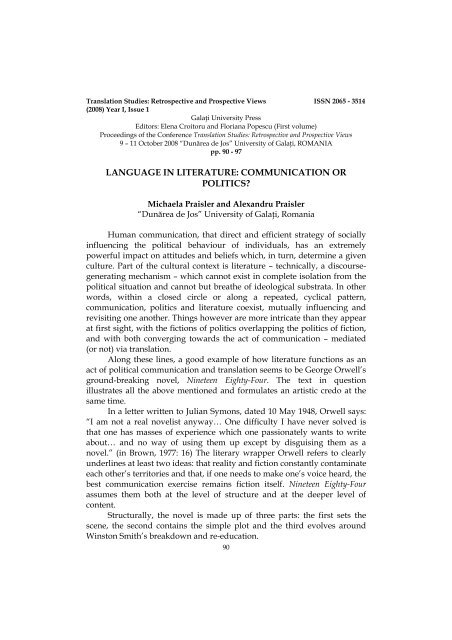translation studies. retrospective and prospective views
translation studies. retrospective and prospective views
translation studies. retrospective and prospective views
You also want an ePaper? Increase the reach of your titles
YUMPU automatically turns print PDFs into web optimized ePapers that Google loves.
Translation Studies: Retrospective <strong>and</strong> Prospective Views ISSN 2065 - 3514<br />
(2008) Year I, Issue 1<br />
Galaţi University Press<br />
Editors: Elena Croitoru <strong>and</strong> Floriana Popescu (First volume)<br />
Proceedings of the Conference Translation Studies: Retrospective <strong>and</strong> Prospective Views<br />
9 – 11 October 2008 “Dunărea de Jos” University of Galaţi, ROMANIA<br />
pp. 90 - 97<br />
LANGUAGE IN LITERATURE: COMMUNICATION OR<br />
POLITICS?<br />
Michaela Praisler <strong>and</strong> Alex<strong>and</strong>ru Praisler<br />
“Dunărea de Jos” University of Galaţi, Romania<br />
Human communication, that direct <strong>and</strong> efficient strategy of socially<br />
influencing the political behaviour of individuals, has an extremely<br />
powerful impact on attitudes <strong>and</strong> beliefs which, in turn, determine a given<br />
culture. Part of the cultural context is literature – technically, a discoursegenerating<br />
mechanism – which cannot exist in complete isolation from the<br />
political situation <strong>and</strong> cannot but breathe of ideological substrata. In other<br />
words, within a closed circle or along a repeated, cyclical pattern,<br />
communication, politics <strong>and</strong> literature coexist, mutually influencing <strong>and</strong><br />
revisiting one another. Things however are more intricate than they appear<br />
at first sight, with the fictions of politics overlapping the politics of fiction,<br />
<strong>and</strong> with both converging towards the act of communication – mediated<br />
(or not) via <strong>translation</strong>.<br />
Along these lines, a good example of how literature functions as an<br />
act of political communication <strong>and</strong> <strong>translation</strong> seems to be George Orwell’s<br />
ground-breaking novel, Nineteen Eighty-Four. The text in question<br />
illustrates all the above mentioned <strong>and</strong> formulates an artistic credo at the<br />
same time.<br />
In a letter written to Julian Symons, dated 10 May 1948, Orwell says:<br />
“I am not a real novelist anyway… One difficulty I have never solved is<br />
that one has masses of experience which one passionately wants to write<br />
about… <strong>and</strong> no way of using them up except by disguising them as a<br />
novel.” (in Brown, 1977: 16) The literary wrapper Orwell refers to clearly<br />
underlines at least two ideas: that reality <strong>and</strong> fiction constantly contaminate<br />
each other’s territories <strong>and</strong> that, if one needs to make one’s voice heard, the<br />
best communication exercise remains fiction itself. Nineteen Eighty-Four<br />
assumes them both at the level of structure <strong>and</strong> at the deeper level of<br />
content.<br />
Structurally, the novel is made up of three parts: the first sets the<br />
scene, the second contains the simple plot <strong>and</strong> the third evolves around<br />
Winston Smith’s breakdown <strong>and</strong> re-education.<br />
90












